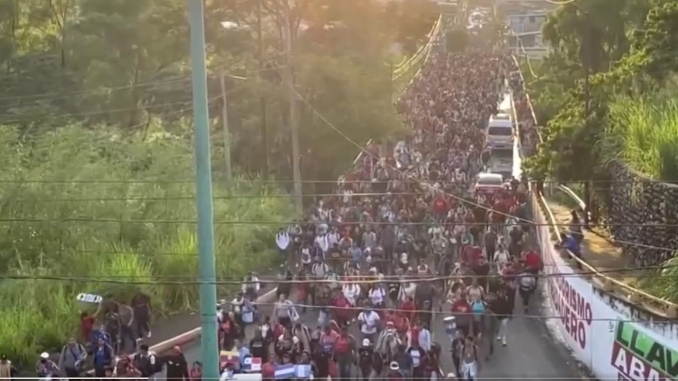
By José Niño
To say that the southern border of the U.S. with Mexico is being overwhelmed by illegal immigration would be a massive understatement. The Federation of American Immigration Reform (FAIR) estimated that roughly 5 million illegal aliens have already crossed the U.S.’s border since Joe Biden was installed in office in early 2021 with more coming.
Click the Link Below to Listen to the Audio of this Article
None of this mass migration influx is a coincidence. The ending of the “Remain in Mexico” policy as well as Title 42 has allowed unprecedented numbers of illegal aliens to penetrate the U.S. The “Remain in Mexico” rule was enacted by former President Donald Trump and required asylum seekers and illegal aliens to stay in Mexico for their court hearings stateside after reaching the southern border. Title 42 was a Trump-era regulation that was implemented to stop the spread of communicable diseases across the nation during the Covid-19 pandemic. Both policies had a noted impact on migration, and both were rescinded by Biden shortly after he entered the White House.
Due to the federal government’s dereliction on immigration enforcement, red states such as Texas have had to pick up the slack by implementing their own measures to stem the flow of illegal aliens. Texas has already done so by creating improvised border barriers, carrying out anti-illegal immigration crackdowns such as Operation Lone Star, and busing thousands of illegal aliens to blue cities and states.
On Oct. 12, Texas public officials continued pushing the envelope when the Texas State Senate passed legislation that would grant local and state level law enforcement the power to arrest illegal aliens by making it a state crime to illegally cross into the U.S. As current law dictates, state and local law enforcement must obtain permission from the federal government before arresting illegal aliens strictly on immigration grounds.
Republican state senator Brian Birdwell was the primary author of SB 11, known as the Border Bill. He observed that “Texas reached a record number of illegal immigrant apprehensions in fiscal year 2023, with over 1.84 million apprehensions in Texas sectors.”
“As a result of the federal government’s unwillingness to enforce federal immigration laws and secure our southern border,” Birdwell added, “Texas has stepped up and devoted time and resources to combat the unprecedented border crisis that the state is facing.”
Several Democratic elected officials, such as state senators Juan “Chuy” Hinojosa and César Blanco, have been critical of this bill.
“Where do we put all the people?” inquired Hinojosa.
For his part, Blanco said he voted against SB 11 due to how there are already federal laws against “unlawful entry” into the country on the books.
“The federal government already has an offense for unlawful entry into the U.S., but that has not turned away desperate migrants looking for a better life,” Blanco said in a public statement. “I voted against SB 11 because this bill will only overwhelm local prisons and court systems with non-violent offenders and raise taxes on border communities while doing nothing to mitigate the humanitarian crisis on the border.”
The senators’ pushback against SB 11 is to be expected. Going back to 2010, similar opposition was manifested towards Arizona’s SB 1070 immigration crime bill. Under this law, it became a state crime for individuals who were in violation of several federal immigration laws. Moreover, it required non-citizens to register and bring their documents with them.
Arizona Democrats and national organizations such as the American Civil Liberties Union were quick to demonize SB 11 for allegedly being “racist” in nature and posing a threat to individual liberties. The courts ended up striking down significant provisions of SB 11. However, the requirement for law enforcement to inspect immigration documents when they suspect an individual is in the country illegally stayed intact.
With the Texas state government currently taking on a more activist role in border enforcement, it will likely face similar resistance from leftist organizations and mass migration boosters.
State enforcement of immigration policy is not a novel concept. From the nation’s founding until 1876, the very year the Supreme Court issued its Chy Lung v. Freeman decision, states and localities had the power to kick out immigrants based on desirable traits or lack thereof. The inability to do work, the propensity to commit crime, and mental illness were prominent traits that could get immigrants deported. However, by the 1880s, the federal government started assuming a stronger role in immigration enforcement.
Irrespective of the pushback Texas’ latest immigration enforcement measure will face, policymakers can’t afford to fold to outside pressure. The fact of the matter is that the federal government refuses to enforce existing immigration laws. Consequently, states will have to start filling in the enforcement void.
A failure to adapt to this national emergency will result in the inevitable dissolution of this once great nation. Now is not the time to be playing by the book and conceding to the demands of far-left activist organizations and elected officials.
José Niño is a freelance writer based in Austin, Texas. You can contact him via Facebook and Twitter. Get his e-book, The 10 Myths of Gun Control at josealbertonino.gumroad.com. Subscribe to his “Substack” newsletter by visiting “Jose Nino Unfiltered” on Substack.com.




